
The one thing that I consistently repeat and believe in is that the
Language of Food is universal. Its inevitable to find similarities
between different cuisines in some way or the other. If you thought that
Italian and Indian cuisine have no similarities at all , then the
technique of making Rumali roti and Pizza dough will amaze you. If you thought Bread pudding was an American tradition, then Indian Hyderabadi Ka Meetha
will put things in perspective. I am not even going into the
similarities of Mexican and Indian cuisine. Talking about the pizza and
rumali roti, there is another close competitor there too.
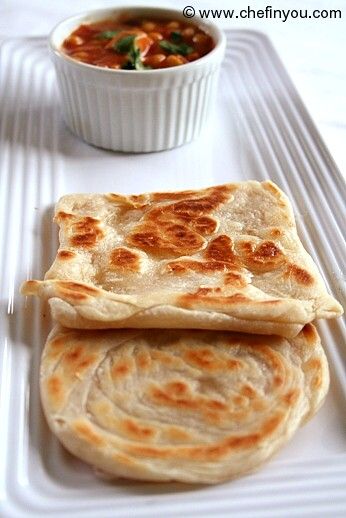
The Malaysian, the Singaporean, Indian and the Austrian share the
"stretching" the dough technique by way of their Roti Canai, Roti Prata,
Kerala Parotta and Apple Strudel
respectively. The concept is same in all of them, with very minor
technical changes. If you learn one technique, you can pretty much
conquer the rest. How about that for convenience? :) Whatever technique I
learnt from making the Pizza dough, rumali roti, parotta and the strudel , they all came into play for making the famous Malaysian Roti Canai which is v similar to Singaporean Roti Prata ( Indian "Parotta" - Singaporean "Prata" - even names match!). Add a fried egg at the end to this Roti and you get Roti Telur
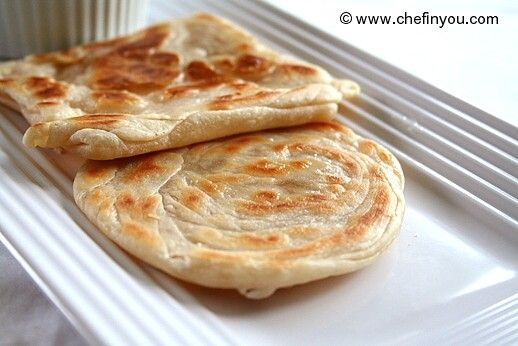 I am going to show 3 methods of making this Malaysian delicacy.
The first method is what is usually followed by the professional
vendors there. Complicated to the less acrobatic inclined. The second
method is my way of making it easier for the home cooks - who either
don't want to the twists and turns in the air ( who wants a dirty
ceiling or floor?) or don't have the patience/time for the same. May
seem more laborious than the air twists, but believe me, it saves really
lot of time if you are starting out. The third method is very similar
to making parottas. I think the traditional Malaysian flat bread are
mostly square/rectangle shaped, but I also found versions which are
round. Hence my third method is for making nice round/oval shapes.
I am going to show 3 methods of making this Malaysian delicacy.
The first method is what is usually followed by the professional
vendors there. Complicated to the less acrobatic inclined. The second
method is my way of making it easier for the home cooks - who either
don't want to the twists and turns in the air ( who wants a dirty
ceiling or floor?) or don't have the patience/time for the same. May
seem more laborious than the air twists, but believe me, it saves really
lot of time if you are starting out. The third method is very similar
to making parottas. I think the traditional Malaysian flat bread are
mostly square/rectangle shaped, but I also found versions which are
round. Hence my third method is for making nice round/oval shapes.
 All of them make amazingly flaky flatbread and is delicious. But this is
RICH and HEAVY dish thanks to the use of all that Ghee ( clarified
butter). Butter may be used, but I would advise getting some traditional
ghee for this dish. Its worth it and the taste is out of this world.
Make any spicy side dish to go with canai. Many recipes use eggs in the
dough, but I have made an eggless version. If you want, you can add an
egg to this recipe and reduce the amount of water/ghee while making the
dough.
All of them make amazingly flaky flatbread and is delicious. But this is
RICH and HEAVY dish thanks to the use of all that Ghee ( clarified
butter). Butter may be used, but I would advise getting some traditional
ghee for this dish. Its worth it and the taste is out of this world.
Make any spicy side dish to go with canai. Many recipes use eggs in the
dough, but I have made an eggless version. If you want, you can add an
egg to this recipe and reduce the amount of water/ghee while making the
dough.

 I am going to show 3 methods of making this Malaysian delicacy.
The first method is what is usually followed by the professional
vendors there. Complicated to the less acrobatic inclined. The second
method is my way of making it easier for the home cooks - who either
don't want to the twists and turns in the air ( who wants a dirty
ceiling or floor?) or don't have the patience/time for the same. May
seem more laborious than the air twists, but believe me, it saves really
lot of time if you are starting out. The third method is very similar
to making parottas. I think the traditional Malaysian flat bread are
mostly square/rectangle shaped, but I also found versions which are
round. Hence my third method is for making nice round/oval shapes.
I am going to show 3 methods of making this Malaysian delicacy.
The first method is what is usually followed by the professional
vendors there. Complicated to the less acrobatic inclined. The second
method is my way of making it easier for the home cooks - who either
don't want to the twists and turns in the air ( who wants a dirty
ceiling or floor?) or don't have the patience/time for the same. May
seem more laborious than the air twists, but believe me, it saves really
lot of time if you are starting out. The third method is very similar
to making parottas. I think the traditional Malaysian flat bread are
mostly square/rectangle shaped, but I also found versions which are
round. Hence my third method is for making nice round/oval shapes.
 All of them make amazingly flaky flatbread and is delicious. But this is
RICH and HEAVY dish thanks to the use of all that Ghee ( clarified
butter). Butter may be used, but I would advise getting some traditional
ghee for this dish. Its worth it and the taste is out of this world.
Make any spicy side dish to go with canai. Many recipes use eggs in the
dough, but I have made an eggless version. If you want, you can add an
egg to this recipe and reduce the amount of water/ghee while making the
dough.
All of them make amazingly flaky flatbread and is delicious. But this is
RICH and HEAVY dish thanks to the use of all that Ghee ( clarified
butter). Butter may be used, but I would advise getting some traditional
ghee for this dish. Its worth it and the taste is out of this world.
Make any spicy side dish to go with canai. Many recipes use eggs in the
dough, but I have made an eggless version. If you want, you can add an
egg to this recipe and reduce the amount of water/ghee while making the
dough.

Basic Information
Prep Time: 2 to 4 hours
Cook Time: Under 30 min
Serves: 3 people
Yield: Makes around 10 medium sized rotis
Ingredients
- 1-1/2 cups ( 10oz or about 300 gms) all purpose flour
- 1/2 cup ghee (clarified butter)
- 1/2 cup water, give or take few tbsp.
- salt to taste
Method
1
Method - for making the dough
Sift the flour and salt into a medium bowl.
Sift the flour and salt into a medium bowl.
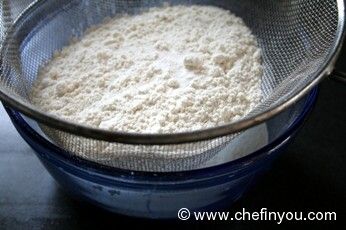
2
Now add 1/4 cups of ghee into a hole made in the dough.
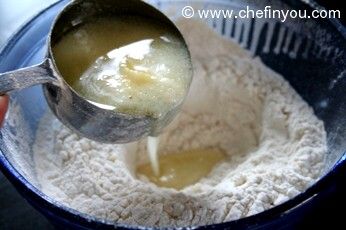
3
Mix well and gradually add enough water to bind the dough.

4
Next knead the dough on a greased counter top for 5-8 minutes.
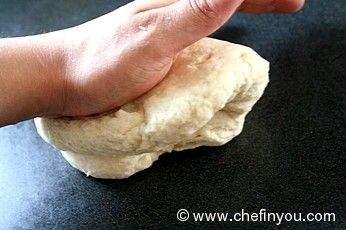
5
It takes time and little muscle, but this step is necessary to make a pliable dough.
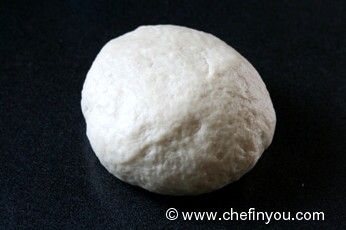
6
Place it back in the bowl and let it rest for at least 2 hours. This helps the dough to stretch well.
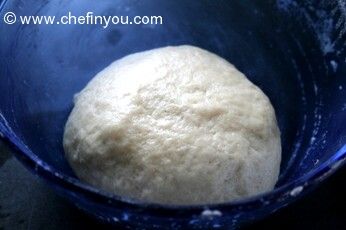
7
Method 1 - The Professional ( and traditional ) Method - Takes skill
Take a small ball of the dough.
Take a small ball of the dough.
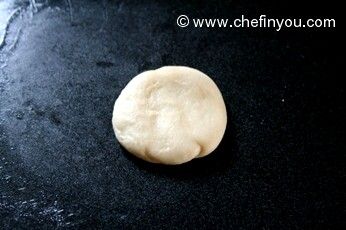
8
With the hands, press it with the hands and lightly stretch it.

9
Now start doing as depicted in the video.Looks
easy doesn't it? Oh well, looks can be deceiving sometimes. If you
tried it and you found yourself cursing that man in there for misleading
you, then Go to Method 2
Method 2 - Mostly Traditional Method - No skill set required
Take a small ball from the dough.
Method 2 - Mostly Traditional Method - No skill set required
Take a small ball from the dough.
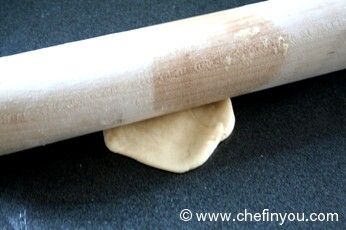
10
On a very well greased counter top, place the dough and using a rolling pin,
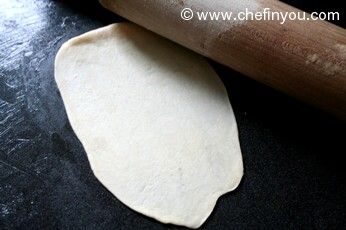
11
roll the dough as much as you can.

12
Then slowly using your
hands, pull at one end of the dough. You can rest one hand in the middle
of the dough and using another hand pull at the ends. Be gentle to
avoid the dough getting torn ( not that it really matters that much ).
Slowly do this at all the ends, until you can see through the dough.
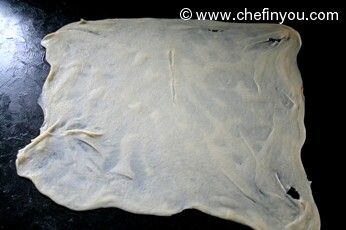
13
Now fold one end of the dough, by bringing the top end to the middle
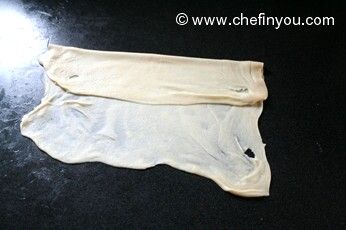
14
Repeat with the bottom end.
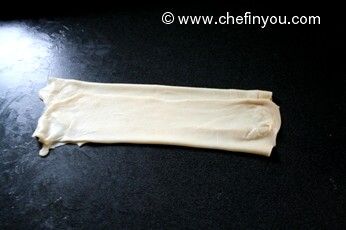
15
Now bring the right end

16
and then the left.
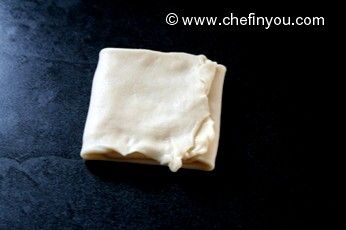
17
Now slowly using your hands, stretch the dough a bit on all the ends.
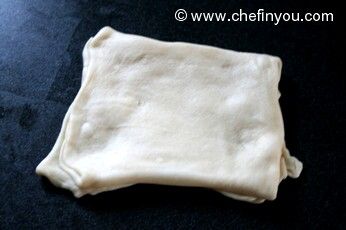
18
In a greased skillet, cook the prata for 1-2 minutes
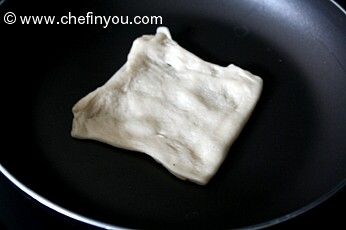
19
until browned

20
Turn and then repeat.
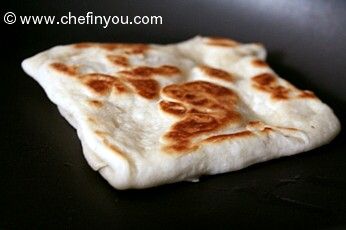
21
Method 3 - for making spirals/ round shapes.
The first 2-3 steps are the same. Take a small ball of dough and using a rolling pin roll it as much as you can until they are see through ( same as method 2)
The first 2-3 steps are the same. Take a small ball of dough and using a rolling pin roll it as much as you can until they are see through ( same as method 2)

22
Now start with the longer end. Start pleating the dough.
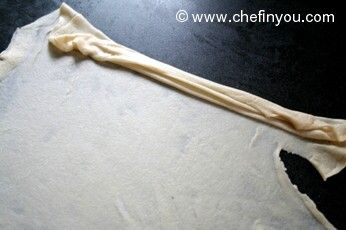
23
Do this until you reach the end.
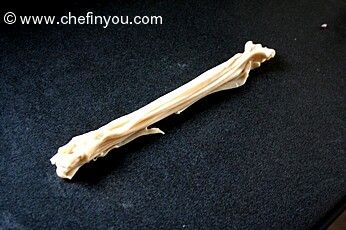
24
Hold both ends of this
dough rope. Slowly twist and turn it in the air, lightly. It will start
stretching between your hands. Make it as long as you can.

25
Now slowly circle the
dough, starting from one end, until you reach the other end. BTW keep
your hands greased throughout this process. The dough should not stick
anywhere
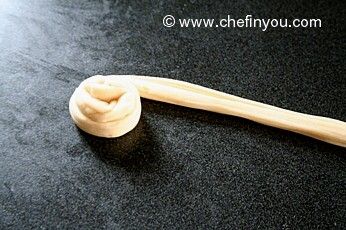
26
Once twisted completely, press it lightly with your hand to make a flatbread.
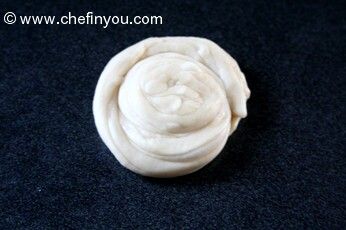
27
Using a rolling pin, roll the dough as much as you can and to desirable thickness.
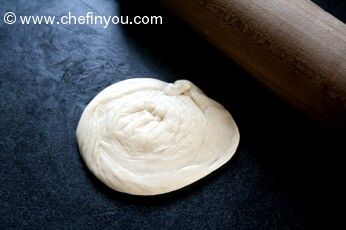
28
Cook in a skillet greased with ghee for 1-2 minutes until browned.
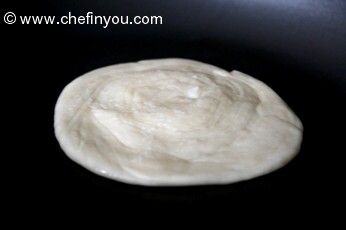
29
Turn and repeat.
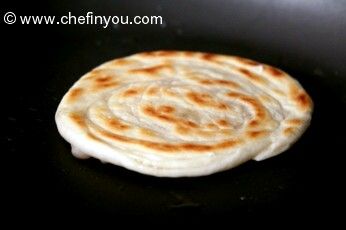
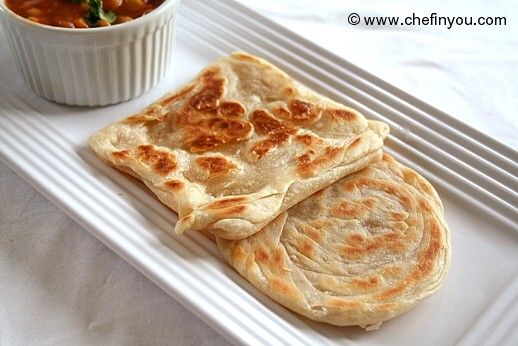 They go very well with any spicy gravy based dish.
They go very well with any spicy gravy based dish.
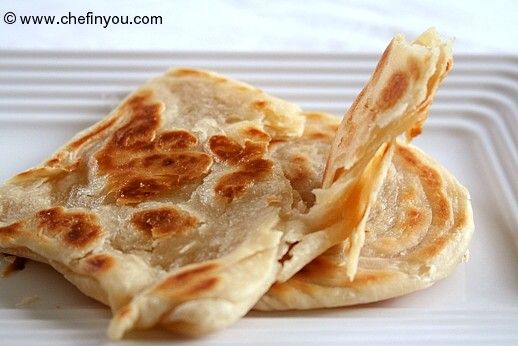 They are very flaky and soft.
They are very flaky and soft.
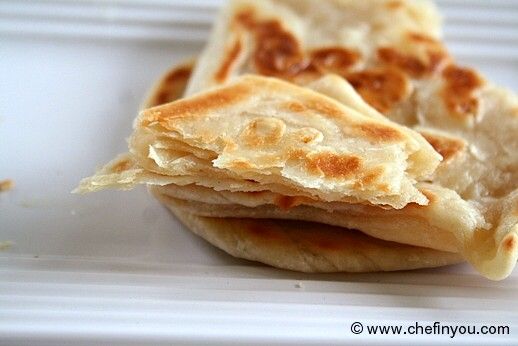
Hi, I just wanted to let you know that this is the best guide I have found for making roti canai! I wish I had found it before following load of other recipes.. I was thinking about writing a guide like this for people but I think you have covered just about everything! One question - when I used to have this dish in Malaysia, it was served with quite a thin red curry sauce. Any idea what this may have been / do you have a recipe? I have been having it with a massaman, which is lovely but now craving whatever that sauce was! Thank you
ReplyDelete